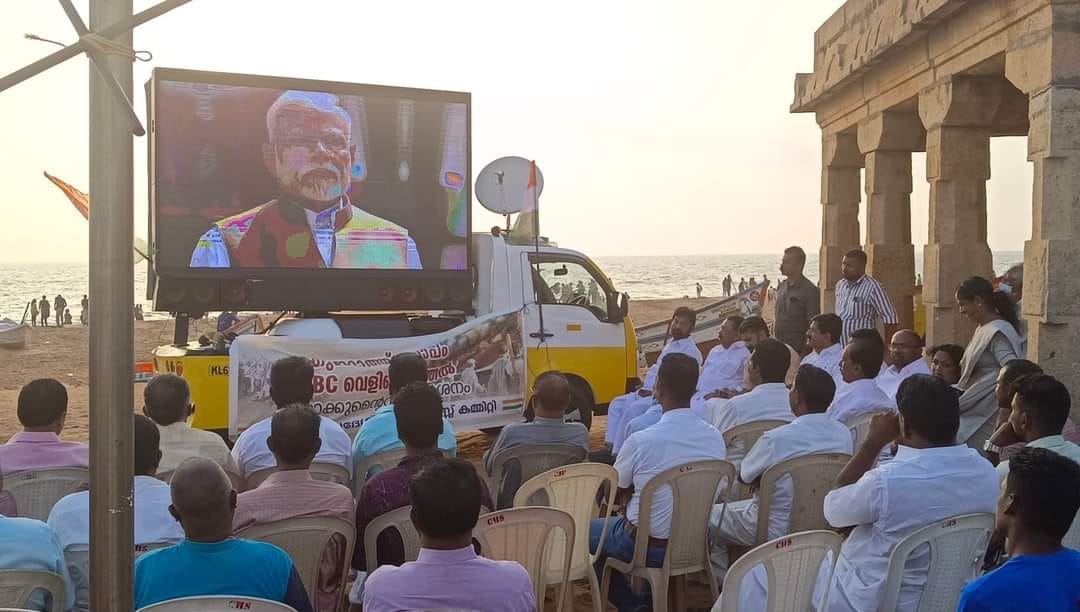The plea alleged that the documentary is a 'result of deep conspiracy against the global rise of India and its prime minister'.

Screening of the BBC documentary on Shanghumugham beach in Thiruvananthapuram by the Kerala Congress. (KB Jayachandran/South First)
The Supreme Court on Friday, 10 February, dismissed a plea seeking to impose a complete ban on the British Broadcasting Corporation (BBC) in India, saying it is “entirely misconceived”.
A bench comprising Justices Sanjiv Khanna and MM Sundaresh passed the order while hearing a plea filed by Vishnu Gupta, president of the Hindu Sena, and Beerendra Kumar Singh, a farmer.
“The writ petition is entirely misconceived and has no merit and is accordingly dismissed,” the bench said.
Alleging that the BBC has been biased against India and the Indian government, the plea alleged that its documentary on Prime Minister Narendra Modi is a “result of deep conspiracy against the global rise of India and its prime minister”.
“The documentary film by BBC relating to Gujarat violence 2002 implicating Prime Minister Narendra Modi is not only reflective of anti-Narendra Modi cold propaganda broadcast to tarnish his image alone but this is anti-Hinduism propaganda by the BBC to destroy the social fabric of India,” the plea had alleged.
On 3 February, the apex court had sought responses from the Centre and others on separate petitions challenging its decision to block the documentary from being viewed in India.
The pleas, on which notice was issued by the top court, were filed by veteran journalist N Ram, Trinamool Congress MP Mahua Moitra, activist lawyer Prashant Bhushan, and lawyer ML Sharma.
The top court had on that day also directed the central government to produce original records relating to its decision to block the BBC documentary.
On 21 January, the central government had issued directions for blocking multiple YouTube videos and Twitter posts sharing links to the controversial documentary.
However, various political parties and student groups have organised screening of the documentary Modi: The India Question in various places, including public spaces and campuses.
Recently, on 5 February, the documentary was dubbed into Tamil and was screened across Tamil Nadu by a political party, Viduthalai Chiruthaigal Katchi (VCK).
VCK leader and Lok Sabha member Thol Thirumavalavan initiated the process of translating the BBC documentary into Tamil and screened it at an event held at Ambedkar Thidal, the party’s headquarters, in Chennai.
While there is no official order for a ban on the BBC documentary, the Union government has consistently blocked links streaming the BBC documentary that covers the 2002 Gujarat riots and its aftermath, and the rise of Prime Minister Modi.
The second part of the documentary covers the anti-CAA-NRC protests, the Delhi riots, and the assault on students of JNU during the anti-CAA protests.
Earlier, the Congress party, on 26 January, held a public screening of the documentary at the Shangumugham beach in the capital city of Kerala, Thiruvananthapuram. Students groups widely screened the documentary across Kerala.
The documentary was screened twice on the University of Hyderabad (HCU) campus — on 21 and 26 January — and on the English and Foreign Languages University (EFLU) campus on 26 January.
On 1 February, students belonging to the students’ wing of BRS were detained by police for allegedly planning to screen the controversial documentary inside the Osmania University Campus in Hyderabad, “without permission”.
(With inputs from PTI)

Apr 13, 2023

Feb 17, 2023

Feb 16, 2023

Feb 14, 2023

Feb 13, 2023

Feb 02, 2023